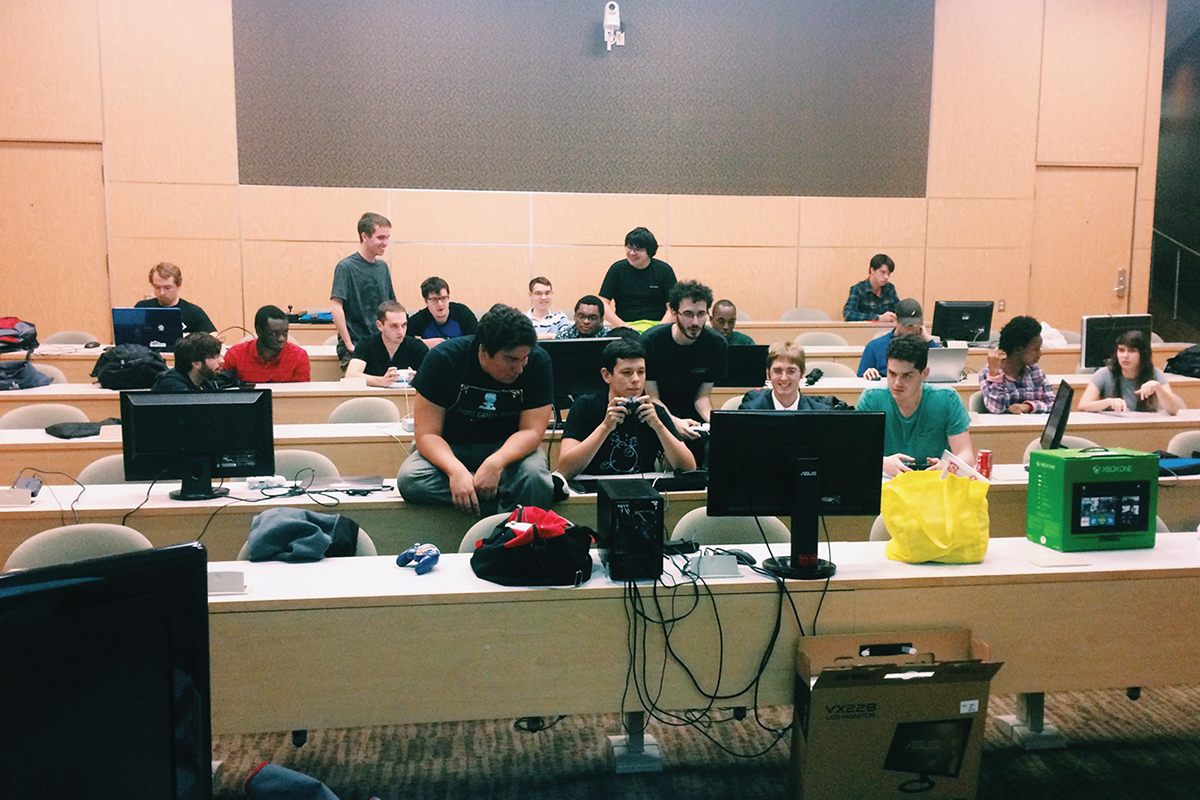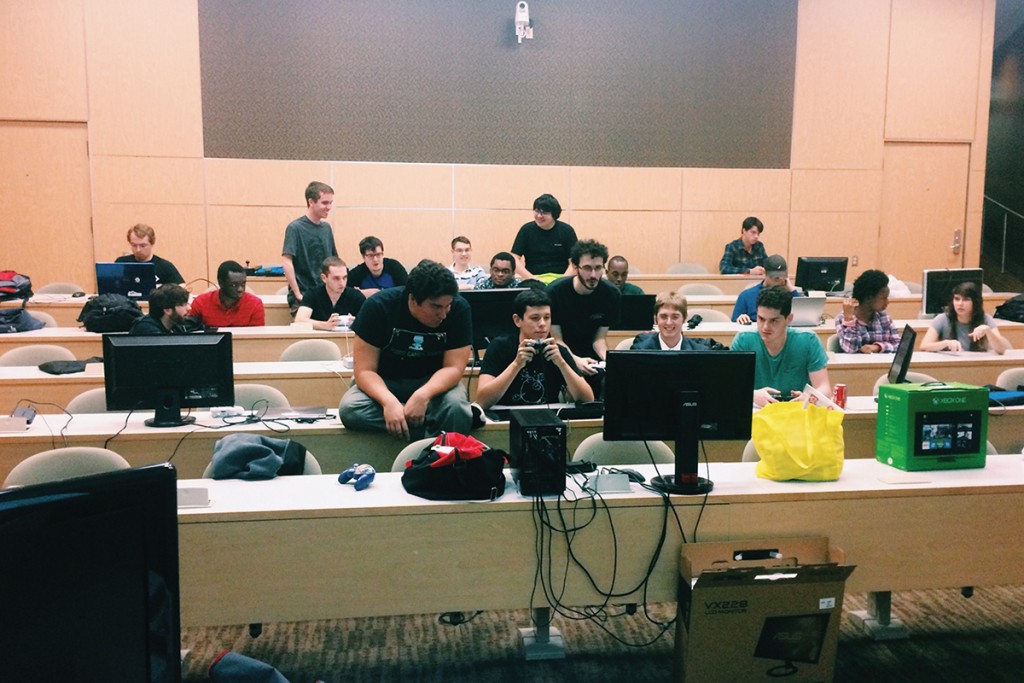

When junior Nikhil Delahaye holds a video-game controller in his hands, he doesn’t view the game in front of him as a pastime. To him, the games tell stories in which the player is an actor and the player’s actions help to write a narrative.
“As we have more and more different stories to tell, being able to tell stories through games and the interaction with it might make some stories more impactful,” he said. “It’s a new medium … Once the medium finds its stride, it can be very, very powerful in being able to tell stories about what it is to live life.”
Clay Ewing, assistant professor in the School of Communication’s Department of Cinema and Interactive Media, teaches a variety of game design and development classes. According to Ewing, games have the ability to affect how conversations are sparked and have a real social impact. Some stories may be for pure entertainment, but others are narrative-driven and have a story to tell, he said.
“Games as a medium provide a nice way to tell stories in a different way, and I think, for millennials and beyond, games are their dominant storytelling device,” Ewing said. “I think that more likely, you’re going to find a common bond with someone over talking about Super Mario Bros. or Pokemon. It brings the same feelings they had from previous experiences back.”
Delahaye has been playing video games since he was six years old, when his uncle bought him a GameCube. Since then, he has only grown more passionate about gaming. He is the treasurer of the Video Games Club (VGC) and host of the show “Reaction Replay,” which focuses on video-game music and conversation on WVUM.
“It focuses not just on video-game music, but video-game culture and video-game discussion in general,” Delahaye said. “I feel like there’s so many big things going on in gaming, especially down here in South Florida … that people might really need a base for community discussion and a place to reach out for all video-game discussion.”
Every Tuesday night from 8-10 p.m. on WVUM 90.5 FM, Delahaye’s show plays a variety of video-game music, ranging from nostalgia-based to lesser-known music from smaller games, featuring orchestras and symphonies.
“It’s so varied and it’s so interesting when it comes to the different genres that are available. And because they are all designed to be in the background and help motivate you to [reach] a certain goal, I always find that it’s perfect studying music,” he said. “Video-game music has exploded to music that everyone can enjoy and it has become music that really has a universal appeal to everyone and expresses so much emotion and so many different viewpoints just through musical composition.”
Junior Alex Ruhlman first became interested in video games when he saw his father play Galaga at a local arcade while in Korea with the Air Force. The then-six-year-old couldn’t think of anything cooler to join in on.
“I was like ‘What is this, this is so cool! I want to get in on that,’” Ruhlman said.
That Christmas, Ruhlman’s father connected a Nintendo 64 with Mario Kart to a TV at their hotel and handed Ruhlman the controller. Fourteen years later, that same excitement for gaming remains with him. Video games, Ruhlman says, have a psychological thrill that can’t be found from exercising or other activities.
“You would think that it’s just a video game, but because you can make money out of it if you’re good enough, for some people it really it is all they have,” Ruhlman said. “For some people who are having troubles at home or they aren’t doing so well at school or something’s going on with their family, for those few hours of that week when you’re there just to play a game, you’re like, ‘I need to channel every single emotion I have to win.’ I don’t know what else you can get that with … It’s real mental athletes who are putting in time, effort and money for pride.”
Both in VGC, Delahaye and Ruhlman expressed how the club has helped them to find a community-driven group of gamers with a uniting factor: their passion for playing.
“There are so many people who I’ve seen [who] were able to find a comfortable place and step out of their shell in Video Games Club, who were able to be social and have that great support system,” he said. “It’s been a place for me to share these passions with people because it doesn’t matter what game you play – being able to talk about it with someone is positive and there are so many social aspects of being able to play games with other people in a social environment … an in-person experience instead of online-only games.”
VGC President Heather Zons, a senior, joined the club back in her freshman year. After realizing she didn’t share many interests with the girls on her floor, she wanted to find people to connect with.
“Video Games Club has definitely been a wonderful part of my life because of the community it has created in such a short amount of time it has been around. I wouldn’t be the same person today if it wasn’t for VGC,” she said. “My favorite thing about video games is the stress relief I feel from them. I get to disconnect from the pressures of the day or of life and just enjoy playing alone, with friends or online with people around the world.”
While there are stereotypes associated with gamers, Delahaye says that the club’s diversity shows that those stereotypes are not reality.
“Gamers have this stereotype of being acne-ridden white boys,” he said. “In terms of helping [deconstruct] the stereotype of gamers … I’m a minority, I’m black and our president is a woman. Those are two populations that people don’t tend to think of.”
Instead of being anything like the preconceptions associated with video games, VGC is a diverse group that accepts anyone with an interest in playing, Delahaye said.
“It’s such a great environment to be able to have such diverse members, where it’s a safe space for them and we’re going to treat them as equals and treat them with respect,” he said. “Girls, guys, everyone has experience with video games because that’s the generation we grew up in, and being able to share that experience is great.”
The community and interactive elements of gaming that have played such a large role in Delahaye’s life are things he hopes to share with others, Delahaye said.
“I feel like being able to show people what the good in video games is … really what I’m passionate about now. Spreading games to everyone because you never know, one game could be what ends up changing the course of your life and you’ll never know unless you experience it. I feel like everyone deserves that chance,” Delahaye said.
While original gamers were considered a subculture, the gaming community has become much more than that, Ewing said. The gamers who were originally labeled as a subculture are no longer regarded that way.
“I think, recently, it’s been shown that it’s not just a game community … Now, the subculture has turned into a mainstream culture and now there’s subcultures within that greater culture,” Ewing said.





